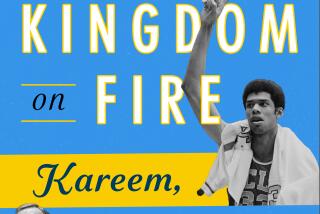Winger’s Winning Worth the Wait : Senior Bowler From Tarzana Sets Mark With His Father Cheering From Afar
- Share via
Friends say that Perry Winger has an unusual relationship with his son. Ron Winger, a professional bowler from Tarzana, and Perry Winger have a symbiotic existence.
On the afternoon of June 30, Perry’s intuition was telling him to get out of the house. Something special was going to happen that day; Ron was bowling on television in the final round of a Senior PBA tournament. Perry sensed a celebration.
So he departed his Las Vegas home that afternoon, planted himself in front of a big-screen TV at Arizona Charlie’s bowling center/casino and watched a miracle unfold. Perry, 72, watched his son make bowling history.
Ron Winger rolled 12 consecutive strikes, scoring a perfect 300 to win the championship of the Wyoming Valley Professional Bowlers Assn. Senior Open.
“I started screaming and hollering,” Perry said. “I was seeing something I’d always dreamed would happen.”
In that moment, Perry’s son not only became the second man in the 34-year history of the PBA to roll a perfect game in a televised final, he became the only man to roll 23 strikes in 24 frames to close out a tournament.
“I was jumping up and down,” Perry said. “I looked around and there was a crowd of people behind me doing the same thing.”
Perry had attracted the crowd. As Ron registered strike after strike after strike, Perry started cheering wildly. Those who gathered became more than curious when they saw Ron’s semifinal score flash on the giant screen: 279.
Twelve frames, 11 strikes.
“Someone said, ‘Do you know this guy?’ ” Perry continued. “I said, ‘I’ve known him for 51 years.’ ”
Later, the phone rang at Arizona Charlie’s. Ron Winger was calling for Perry Winger.
“He said, ‘Dad, did you think I was going to make it?’ I said yes.”
Perry had always believed Ron would make it. It just took a while.
Winger became a tour champion at 51. Those who saw him bowl as a youth figured he would do it at 21. They believed Ron was every bit as good as another kid from the Valley, Barry Asher, a Hall of Famer who went on to win 10 PBA tournaments.
“Barry and Ron were always one and two, or vice versa,” said Harry Grant, 81, who coached the two as teen-agers. “They were both premium bowlers.”
The mention of Winger made Asher recall a debate he once had with Andy Marzich, a PBA Hall of Famer from Torrance. The question: Who was the region’s best young bowler?
Out of mutual respect, Asher and Marzich nominated each other before Asher settled the dispute.
“I said, ‘You know who was really the best bowler to come out of Southern California? It was Ron Winger.’ ”
But it was a failed career on the PBA Tour that led Winger to join the PBA Senior Tour in 1992.
In his first year of eligibility, Winger turned heads. He made three championship-round appearances. He had the fourth-best average on the 11-stop tour (218.57) and finished seventh on the money list with $21,707.
A career-long drought finally ended this year when Winger won his first pro championship in the Chicagoland Senior Open in May. Then, in the very next tournament in Wilkes-Barre, Pa., Winger rolled his history-making 279 and 300 to win again.
More than three decades later, Ron Winger had finally--and suddenly--emerged with back-to-back titles.
With four 1993 tournaments remaining, Winger is the Senior PBA’s fifth-leading money earner with $36,325. He has at least another $10,000 in bonuses.
“It doesn’t surprise me he’s out there beating those guys,” Asher said. “Ron has natural talent. He never lost it. I knew he could still be great.”
Early on, Perry Winger detected the same kind of quality in Ron--a nature he believed would set his son apart from others. The first sign came in the late 1940s, soon after Perry bought a house in Van Nuys. Ron and some friends had turned a nearby vacant lot at the corner of Victory and Sepulveda boulevards into a playground.
One day the inevitable happened: Construction crews arrived. A bowling alley was built on the lot. The boys, angered by the hard-hat intrusion, refused to give up their turf. But soon they stopped playing with dirt clods and switched to bowling balls.
Grant, manager of the newly opened lanes, gave them lessons and put them in a traveling league. He was a good teacher. Teen-age members of the Winger gang--Dave Maron, Doug Fansworth, Mik Tannler, Paul Edmondson and Jay Simon--all carried 170 averages.
Winger was clearly the most talented of the bunch. He became the Southern California junior bowler of the year in 1959. And two years later--at 20--he was champion of the first amateur state tournament, the California Masters, and crowned Southern California bowler of the year.
Winger had played his first PBA Tour event at the Bowladrome in Torrance the year before and broke even, winning $100 after he paid $100 to enter. He was encouraged--he had “cashed,” as they say in the PBA. Two years later, Winger started bowling regularly on the tour, launching what many figured was a Hall of Fame career.
But from 1963 to 1979, Winger not only failed to win, he was able to break the top 50 money list only once. He was 48th in 1963, earning $5,165. The PBA misspelled his name in the record book, and the 1963 chart still identifies him as Don Winger.
Making good money on the PBA was difficult then. But Winger faced a more jarring setback. Frank Mallard, a local car dealer who had paid Winger’s tour expenses, died of a heart attack in 1965.
“I was in Kansas City when it happened,” Winger said. “Frank had me scheduled for three more tournaments. When I came home, his wife had cut a check for the expenses. She said Frank would have wanted me to go on. I couldn’t. I gave the check back.”
*
In good times or bad, Perry seemed to be right where Ron needed him. He might have been in the background at the bowling alley. But when it came to Ron’s personal life, Perry stayed in the forefront.
“When we were growing up, it seemed like Perry was glued right behind Ron,” said Simon, once a fellow teen-age bowler. “He’s actually been like a father to me. My dad died when I was young and Perry’s always been there.”
Perry, who worked 40 years for a major studio supervising production assistants, got Ron a job when he quit touring full time. Ron also went to work for Gary Patterson, helping his old classmate at Van Nuys High market his sports art into a million-dollar greeting card and poster business.
Twelve years ago, Winger had saved enough money to start a pro shop at Corbin Bowl, which he still operates.
Over the years, Winger tried his best to keep track of the friends from the dirt lot that became Victory Bowl. Maron, one of Winger’s teen-age traveling league chums, recently moved to Laughlin, Nev. Tannler loaned Winger $5,000 to get started on the senior tour. Fansworth’s whereabouts are unknown. Edmondson, who pitched in the Chicago Cubs’ minor-league system, was killed in an auto accident.
Winger also continued to bowl--uperbly at times. In 1986, he and Simon set a state doubles record that still stands: a score of 1,584 in a series of six games.
But by 1992, Winger was very much alone. He was single after three marriages. He had five children, none of whom lived with him. Only Wendy, 19, his oldest daughter, was still in the Valley. His mother and sister had moved to Ogden, Utah. Daughter Kate, 14, was in Carlsbad. His three youngest children had moved to Alaska. Even Perry was gone, happily bowling in a senior citizen’s league in Las Vegas.
Ron’s 50th birthday and a chance to bowl again on the Senior Tour couldn’t have arrived too soon.
“(The Senior Tour) was a second chance--a last chance,” he said. “I found out the atmosphere was different. There was a lot of camaraderie. I felt a sense of belonging.”
Following his first PBA victory, Winger was staying in Chicago with plans to play in a local doubles tournament when he received a phone call from Alaska. His third wife, Kathy, said Ron Jr., 10, had won a state wrestling championship and was invited to a tournament in Ogden.
Winger hadn’t seen Ron Jr., Cari, 11, and Trish, 9, in eight years. Kathy proposed a week-long reunion but needed financial assistance. Ron balked. He didn’t have enough money.
But days later, Winger won the doubles tournament. He called Kathy back and wired his winnings north. The reunion was on.
“The kids loved Ron like you would not believe,” said Perry, who flew in from Las Vegas. “And I think it gave him a real good boost.”
It did. The next time Winger bowled, he made history.
“Being with my family that week,” Winger said, “it was the best week I’ve ever had. That includes the week I rolled the 300.”
By July 1, life had seemingly returned to its normal status for the Wingers. Ron, the No. 2 qualifier in Wilkes-Barre, was preparing to bowl on TV for the fifth time in two years. Perry--slowed these days by a nerve problem in his legs--ambled into Arizona Charlie’s to watch.
And then for both, imagination became reality.
“I guess you could call it a zone,” Ron said. “The concentration overcame the nerves. It was like everything was in slow motion. I could see myself striding, swinging, following through in slow motion. As a kid, I’d always imagined something like that.”
Out West, Perry had whipped himself into a frenzy. He had waited 38 years for something like this.
“I always said in my own heart he’s my superstar,” Perry said. “Now I can call him that.”
Swarmed by enthusiastic fans after he became the only bowler besides Bob Benoit to score 300 in a final, Ron headed straight for the pay phone at Stanton Lanes to call Perry.
“He’s the greatest dad in the world,” Ron said. “He’s my best friend.”
More to Read
Go beyond the scoreboard
Get the latest on L.A.'s teams in the daily Sports Report newsletter.
You may occasionally receive promotional content from the Los Angeles Times.










